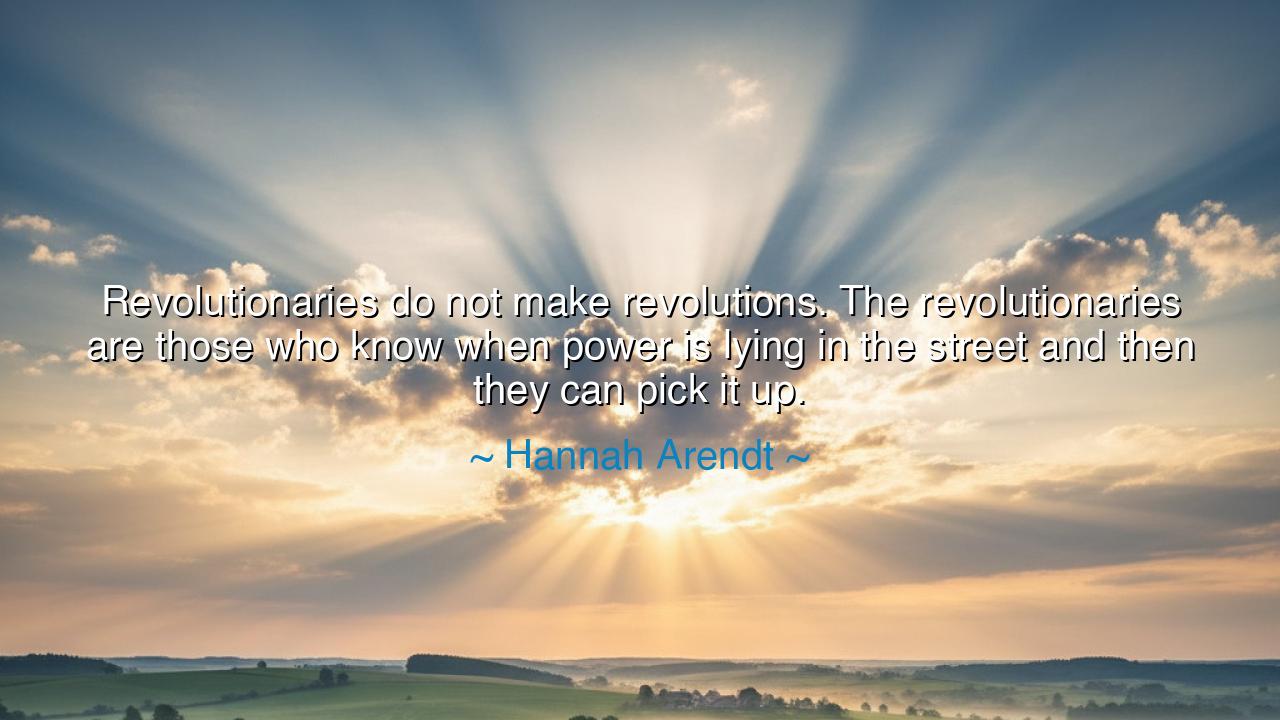
Revolutionaries do not make revolutions. The revolutionaries are
Revolutionaries do not make revolutions. The revolutionaries are those who know when power is lying in the street and then they can pick it up.






Hannah Arendt, the philosopher of power and freedom, proclaimed with piercing clarity: “Revolutionaries do not make revolutions. The revolutionaries are those who know when power is lying in the street and then they can pick it up.” In this saying she strips away illusion: upheavals are not born from the will of men alone, but from the crumbling of old orders. When authority collapses, when the rulers can no longer command and the people will no longer obey, then power lies in the street. The true revolutionary is not the one who invents the storm, but the one who dares to seize its lightning.
The meaning is profound. Revolution is not simply the work of fiery speeches or conspiracies in secret rooms. It is the moment when the balance of society breaks, when legitimacy falters and institutions fail. In such moments, the one who recognizes the vacuum and has the courage to step forward becomes the revolutionary. Arendt reminds us that opportunity, not intention alone, creates revolution. To see that moment and to act is the essence of political genius.
History offers striking confirmation. In 1917, Russia groaned under war, famine, and the disintegration of the czarist regime. Countless radicals had dreamed of revolution, but it was Lenin and the Bolsheviks who saw that power had fallen into the streets of Petrograd. While others hesitated, they grasped it and reshaped a nation. They did not cause the collapse—the weakness of the old order did—but they claimed the prize when others faltered. Thus, Arendt’s words become prophecy: revolutions are seized, not made.
We may look also to the French Revolution. The monarchy had rotted, the people starved, and faith in the crown dissolved. In this void, voices like Robespierre and Danton rose to claim the power that already lay abandoned. Their strength was not in creating collapse, but in recognizing that collapse had already come. Power, like a fallen crown in the dust, awaited the hand bold enough to pick it up.
Therefore, let the seeker of wisdom understand: history is not bent by dreamers alone, but by those who see when the moment of weakness has come and act with daring. Power is not always taken by force—it often lies abandoned, waiting. The lesson of Arendt is timeless: revolutions are not fashioned by will alone, but by the marriage of vision and opportunity. He who knows when the old world crumbles and dares to step forward becomes not merely a witness, but a founder of the new.






QPQi Phu
I can’t help but wonder whether this quote implies that revolutions are almost accidental—spontaneous reactions rather than deliberate transformations. If that’s true, can social progress ever be intentionally engineered, or must we wait for history to create its openings? It’s both humbling and frustrating to think that human will alone might not be enough to shape change, no matter how righteous the cause.
THTrang Ha
This idea raises a profound question about leadership and destiny. If those who seize power during upheaval aren’t necessarily the ones who caused it, does that explain why revolutions often devour their own ideals? Perhaps Arendt was warning that success in revolution depends not on righteousness, but on recognizing the moment when authority collapses. Should revolutions, then, be studied less as moral movements and more as power dynamics?
Ttranthanhtung
I find this perspective unsettling yet fascinating. It suggests that revolutions might be less about ideals and more about opportunism. Does this mean genuine moral conviction plays a smaller role in societal change than we’d like to believe? If so, how should we judge those who ‘pick up power’—as pragmatic realists or as opportunists exploiting chaos? Arendt’s insight feels disturbingly relevant to modern politics.
TNthong nguyen
This quote makes me rethink what it really means to be a revolutionary. If revolutions are not created by willpower but by recognizing moments of opportunity, does that mean history favors those who are simply observant rather than visionary? I’d love to explore whether Arendt implies that social change depends more on timing and circumstance than on passion or ideology. Is awareness itself the true revolutionary act?